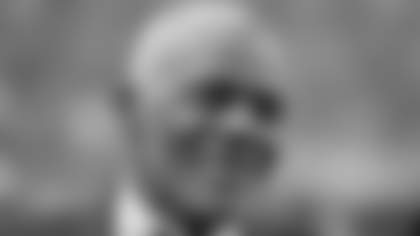EAGAN, Minn. — When Joseph "Juice" Sutton saw Justice Alan Page walking across the turf, he had to connect and thank the Vikings Legend and Pro Football Hall of Famer.
Sutton shook Page's warm, weathered hand — the one that previously helped collapse NFL quarterbacks and later held a Minnesota Supreme Court gavel — and expressed deep gratitude for impacting his life.
"I was one of your Page Scholars," Sutton told him.
A noticeably touched Page, at Twin Cities Orthopedics Performance Center for a Juneteenth celebration earlier this week, spoke with Sutton for a few moments about the scholarship that helped the Minneapolis native transfer from Kansas to the University of Northwestern – St. Paul (which did not offer athletic scholarships) to finish out his collegiate career. "Juice" is now a full-time stand-up comedian and in-game host for the Minnesota Twins and Minnesota Wild.

"Thank you for all the hard work you put in," Page told Sutton before glancing at me with a smile and adding, "See? They're everywhere."
"They," of course, refers to Page Scholars — young students of color who have benefited from the Page Education Foundation since its launch in 1988 by Justice Page and his beloved wife Diane.
"We keep tabs on as many as we can," said Page, who noted that the current principal of Justice Page Middle School was originally one of the foundation's scholars. "What we're about is trying to create opportunity for people through education and create that opportunity, create hope, for those who follow in our footsteps — and you can't help but be proud of all our scholars.
"No matter who they are, no matter what field they've chosen, they continue to do great things," he added. "They continue to make this world a better place. They continue to contribute to who we are as a people and as a community."

Sutton was impacted not just by the $5,000 scholarship he received but also by one of the foundation's requirements: that each recipient commit volunteer hours to working with young children, specifically in the area of education.
"I'm eternally grateful," Sutton said. "Being able to give back to my community, go back to my neighborhood in inner-city North Minneapolis and see kids who didn't think college was in their future, tell them, 'Hey, there are people willing to help you, [invest in you],' that was huge for me."
Sutton's sentiments were echoed recently by fellow Minnesota native Shane Johannsen, who proudly was a Page Scholar for eight academic years, culminating in earning his medical degree from the University of Minnesota.
Johannsen's mother is a first-generation immigrant from the Philippines, and his family benefited from assistance programs while navigating lower socioeconomic situations.
"My aspiration for higher education was nurtured by supportive teachers and counselors at my high school, one of whom introduced me to the Page Education Foundation and encouraged me to apply," Johannsen explained. "Receiving the Page grant was transformative. It not only alleviated financial burdens but also provided a network of support that enriched my educational journey."

Building on Jim Marshall's legacy
Johannsen and Sutton each were grateful to hear of the Page Education Foundation's recent policy change, a strategic expansion of the Page Grant to cover a student's full cost of attendance — not just tuition — beginning in the fall of 2025. This change allows Minnesota students of color to use their Page Grant for essential college-related expenses, including housing, meals, transportation, books and childcare.
Johannsen provided his perspective, noting the grant expansion will "further empower students" to focus solely on education with decreased financial strain.
"I was able to succeed because I had resources such as supplemental educational material, adequate housing and much more," he said. "This holistic approach is vital for fostering success among scholars."

Page Education Foundation Executive Founder Amanda Moua explained the intentionality behind the updated policy.
"In the face of shifting national conversations about equity in education, we're choosing to stay grounded in our mission," Moua said. "This expansion ensures our Scholars receive support that truly meets the realities they face in college today."
The decision to broaden the use of Page Grant funds follows the statewide roll out of North Star Promise, which now covers tuition and fees for many Minnesota students. With those costs largely addressed, the Page Grant will help close the remaining gaps that often stand in the way of degree completion.
Also in mind while making this decision was the recent passing of Vikings Ring of Honor member and community advocate Jim Marshall, who died June 3 at age 87.
A dear friend and longtime teammate of Page's, Marshall demonstrated a deep commitment to Minnesota young people through his co-founding (with former teammate Oscar Reed) of The Link, which supports youth and families experiencing homelessness, who are survivors of sex trafficking or youth who are involved in the juvenile justice system.
Page said his work and Marshall's were analogous in the mission to help young people and meet them where they're at.

"It's about giving them the opportunity to find themselves and to become their best selves," Page said. "In the process, they create hope. And to paraphrase Martin Luther King, Jr., people who have hope want to build and create. People without hope tend to want to tear down. So, that's what the Page Foundation is about; that's what The Link is about.
"Jim's work will continue to touch others. It's going to touch others through what we do," Page continued. "That's the inspiration for it. He was just a caring, thoughtful advocate for young people — and we get to honor that."
The bond between Page and Marshall is undeniable; and even in the wake of Marshall's passing, the two continue to make an impact together.
Page referenced former Vikings Chief Operating Officer Kevin Warren, who once addressed scholarship recipients and reminded them to always pave the way for those coming behind them.
"He told them, when you ride the elevator of success to the top, don't just get off the elevator," Page said. "You actively send it back down so it can bring others up.
"That's what this is all about. I had, Jim had, great success. Good things happened along the way, and there were those who helped us," he added. "What Jim did to help me become a real football player, I can't even articulate — but by doing that, he was offering a hand to those who came behind him. I think we have the opportunity and the obligation to help … and we all win. As Paul Wellstone said, 'We all do better, when we all do better.' "

As the Page Education Foundation continues to honor Marshall's legacy and help others by expanding its reach, students like Johannsen and Sutton will continue to not only fulfill their education and career goals but also make an impact on those coming behind.
"To have a foundation that says … 'We want to sow into your whole life around education,' that's an absolutely game-changer," Sutton said.
Johannsen added that dedication to community service remains a core value as he prepares to graduate from medical school — all thanks to the care and investment showed him by Justice Page, Diane Page and the entire team.
"I am profoundly grateful," he said, "and I'm committed to giving back to my community and addressing the disparities faced by students of color in accessing post-secondary education in Minnesota."















